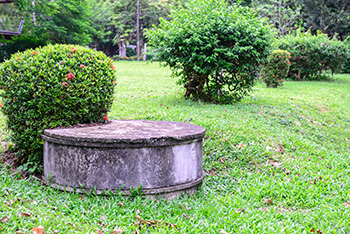
A septic tank and leach field are used to collect household and human waste water and purify it to before returning it to recharge ground water. A well maintained septic tank and leach field system can function for up to 20 years without need for a replacement. However, there are a few steps that the property owners need to take to ensure a properly functioning septic tank and leach field.
Absorption Ability
For a leach field to function properly, it needs to retain its ability to absorb water. For this, you need to take steps to conserve water, by washing only full loads in the washing machine and dish washer, using water saving faucets, showers, and flushes, repairing all leaking faucets, and so on.
Also, you should ensure that non-polluted water such as from down spouts does not enter the septic tank. Instead, have a rain water barrel or direct it away from the drain field or leach field. You should also grade the ground above the leach field so that rain water runs off from the surface, reducing the chances of saturation.
Avoid Soil Compression
The soil above the leach field should not be compressed. So, you should not run heavy machines over the leach field, build over it, or plant trees over it. This will also help ensure that the pipes are not broken or damaged by roots. The only thing you can grow here is lawn grass.
Prevent Clogging of Drainpipes
To prevent the clogging of drain pipes in the leach field, you need to ensure that solids from the septic tank do not enter them. For this, you need to install an outlet filter in your septic tank. This filter should be cleaned once a year.
While the leach field helps to percolate the water from the septic tank while bacteria break down any organic matter, the septic tank is the backbone that traps all solid material. In order to keep the septic tank functioning properly, you need to first ensure that the tank size is appropriate for the needs. A larger septic tank is always better as it will allow the solids to settle and liquefy over time.
In order to liquefy the solids, the septic tank requires an adequate number or bacteria and microbes. To ensure that these thrive, you should take care that you do not add too much bleach, lye, or other substances into the septic tank. To reduce the amount of solids in the septic tank, you can also avoid using a garbage disposal.
You should also never flush non-biodegradable material or partially bio degradable material such as cat litter, diapers, paper, and so on.
To ensure the solids never reach the leach field, the sludge level should always be below the level of the outlet pipe. To make sure of this, you need to get the septic tank inspected by professionals once a year.
We cannot stress enough the importance of inspection of the storm water systems on the property. And the importance of keeping the retention basins clear and water flowing through them. We have seen a lot of over grown properties that do not let water flow properly, this results in a more costly solution. Contact the professionals at Vactone today to schedule your inspection!
